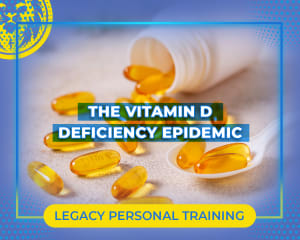
The Vitamin D Deficiency Epidemic
Vitamin D is an essential nutrient that plays a critical role in maintaining good health. It helps to build strong bones and teeth, supports a healthy immune system and sex function, and regulates cell growth and development. Unfortunately, many people suffer from a vitamin D deficiency, even in sunny climates! Vitamin D deficiency can have some serious consequences for their health. Here’s what you need to know to stay healthy!
What is Vitamin D?
Vitamin D is a fat - soluble vitamin that is produced in the skin when it is exposed to sunlight. It can also be obtained from certain foods, such as fatty fish, eggs, and fortified dairy products. Vitamin D is necessary for the body to absorb calcium and phosphorus, which are important minerals for building and maintaining strong bones and teeth.
Vitamin D also helps to regulate the immune system, which is critical for fighting off infections and diseases. It has also been linked to the prevention of chronic diseases, such as heart disease, diabetes, and certain types of cancer.
What Causes Vitamin D Deficiency?
There are several factors that can contribute to a vitamin D deficiency, including:
Lack of sunlight exposure: People who spend most of their time indoors or live in areas with limited
sunlight are at a higher risk of vitamin D deficiency.
Dark skin: Melanin, the pigment that gives skin its color, can reduce the skin's ability to produce vitamin D in response to sunlight.
Age: As people age, their skin becomes less efficient at producing vitamin D.
Obesity: Vitamin D is fat- soluble, which means it can become trapped in fat cells and not be readily available for use in the body.
Diet: People who do not consume enough vitamin D- rich foods, such as fatty fish or fortified dairy products, may be at risk of deficiency.
Symptoms of Vitamin D Deficiency
Vitamin D deficiency can be difficult to diagnose because the symptoms can be vague and non-specific. Some of the common symptoms include:
Fatigue and weakness
Bone pain and muscle weakness
Depression and mood changes
Impaired wound healing
Hair loss
Increased risk of infections
Poor Libido
If left untreated, vitamin D deficiency can lead to more serious health problems, such as osteoporosis, osteomalacia, and an increased risk of certain types of cancer.
How to Get Enough Vitamin D
The best way to get vitamin D is through sunlight exposure. However, it can be difficult to get enough vitamin D from sunlight alone, especially during the winter months or if you live in a location with limited sunlight. It’s also important to note that applying sunscreen reduces the skins absorption of Vitamin D, so it’s important to find a safe balance of sun exposure.
Food sources of vitamin D include:
Fatty fish, such as salmon, mackerel, and tuna
Egg yolks
Fortified dairy products, such as milk, yogurt, and cheese
Fortified cereals and orange juice
Supplements are another option for people who have difficulty getting enough vitamin D through
sunlight or diet. It's important to talk to your doctor or get your levels tested before supplementing with Vitamin D because excessive vitamin D intake can be harmful.
The recommended daily intake of vitamin D for most adults is 600- 800 IU per day, although some people may
need more. Your doctor can help you determine the right amount of vitamin D for your individual needs.
The Importance of Vitamin D
Vitamin D deficiency is a common problem that can have serious consequences for your health. It's important to get enough vitamin D through sunlight exposure, diet, or supplements to maintain strong bones, support a healthy immune system, and reduce the risk of chronic diseases.
If you think you may be at risk of vitamin D deficiency, talk to your doctor. They can help you determine the best way to get enough vitamin D and monitor your levels to ensure you are maintaining optimal health.

